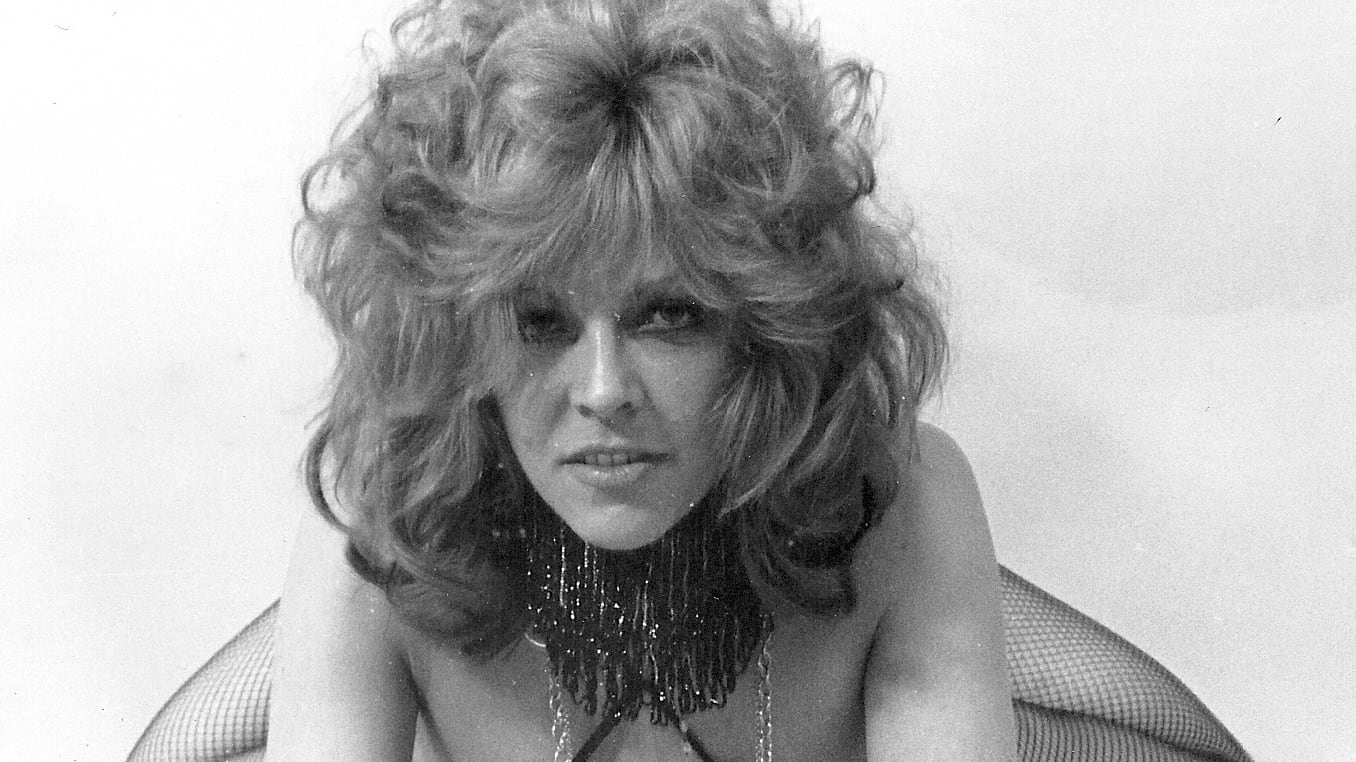Sauntering toward me in the cafe is the legendary burlesque dancer Velvet Ice. She came of age in the funky ’70s but on this Thursday is adorned in a modern black fleece, dark denim flares, and wedge boots. “I’m practicing walking in heels,” she says.
We’re meeting The Infamous Nina Nightshade, a fellow performer and the producer of the long-running annual revue Legendary Burlesque. Nightshade employs Legendary Burlesque to honor living legends from burlesque’s golden era and declining days before the art form’s ’90s revival. Ice headlines Legendary Burlesque at the Alberta Rose Theatre on Sunday, May 4.
Ice’s light crystal eyes pierce mine, bridging a bright, perfect-toothed smile. I can’t decide if they’re blue or green, flustering me as I fumble the right words in our meeting. A gentleman behind us in line who could be close to her age tries to get Ice’s attention by remarking on how enticing the desserts in the pastry case look. She’s able to acknowledge him without breaking her focus on my bumbling description of my brewpub day job as a “beer bar.”
If I wore heels like Ice, they would most definitely be in my mouth, yet her energy—warm, curious and engaging with a splash of mutual nervousness—leaves me mesmerized and feeling valued. It’s one skill among many she’s perfected over a lifetime: how to make someone feel like the only one in the room even when men are openly lusting over her. Women of a certain age are still too often deemed irrelevant and ignored, but Ice, 79, possesses a captivating timelessness. I designate this fragile, petite senior a certified sexpot.
Bergamot Burlesque, Nightshade’s production company, booked a diverse variety of performers to grace the stage in tribute to Ice. Had she and other women not shimmied in the ’70s, Portland’s artists might not have been inspired to peel it off themselves.
“Ladies like Velvet are still performing,” Nightshade says. “They are relevant.”
Velvet Ice began her career in San Francisco in the early ’70s at New Follies. Her boyfriend ran the theater’s lighting, while she was accustomed to playing pool with its performance artists around the corner at the local tavern. After a hemophiliac dancer was rushed to the hospital after stubbing her toe, Ice’s billiard buddies scouted her as a replacement.
“I ran home, shaved my legs, borrowed my girlfriend’s leather coat, and jammed over to the theater,” Ice says.
Shortly before Ice landed the gig, New Follies had transitioned from a traditional burlesque theater to a gentlemen’s club in attempts to compete with the Mitchell Brothers O’Farrell Theatre. The O’Farrell, frequented by Hunter S. Thompson, hosted scores of beautiful women traveling from the East Coast. Sensationally rife with rumors of salacious rendezvous in private rooms, the O’Farrell garnered national attention for popularizing close-contact lap dances.
“‘Let’s hire a bunch of hippies who will be all wild,’” Ice remembers the theater’s owner saying. “And they did. And we did.”
After New Follies’ walk on the hippie wild side concluded, it returned to its roots of traditional burlesque. At the request of management, Ice invested in professional burlesque costumes, and her burlesque career blossomed. The venue still stands, rebranded as the Victoria Theatre, San Francisco’s oldest operating theater.
“Those of us who wanted to continue just begged to be in the show,” Ice says. “You had to love the art form more than you cared about your social acceptability. You forfeited your social acceptability, period. I was kind of lucky. Both my parents were in theater, and I was taught to respect theater.”
Although culture has changed, the stigma surrounding burlesque has remained. Ice and Nightshade have both experienced the stigma and social scrutiny of their beloved art form.
“Even now, there are a lot of performers who have to hide who they are, who could lose their jobs, so I don’t think that has completely gone,” Nightshade says. “I have people ask me, why are you continuing to do this frivolous thing when there are so many important things? Right now, being who you are is important, and the representation onstage is important.”
As a performer who sharpened her skills when the West was more wild, Ice has seen the art form evolve and herself with it. Just as she fought to destigmatize the art form of burlesque, she continues to fight the stigma of ageism. In her 60s, she performed what’s now a signature act to the late Tony Bennett and Amy Winehouse’s duet “Body and Soul.”
“Our culture needs joy and creativity and irreverence and fuck-yous and that sort of thing to keep balance,” she attests. “The powers that be want us to be traumatized, want us to live in anxiety. It’s the rogue move; it’s the rebel move to be happy.”
After nearly six decades as a traveling performer from Canada to Micronesia, Ice recently moved to Portland. This will be her second performance in the city. She has toyed with the idea of hanging up her hat, but couldn’t resist Nightshade.
“Portland is amazing,” she says. “My mind is blown all the time. Burlesque seems to be on fire here.”
Legendary Burlesque includes a silent auction benefiting BurlyCares, a nonprofit that assists senior variety show performers with basic life necessities. This year’s beneficiary is Mickey Mae Faerch, a Danish Canadian dancer, also of Ice’s era, known as “the Little Mermaid of Burlesque.”
“I know a lot of these ladies had income that doesn’t show up in the same way as if you have a day job, so the support they have at the end of their lives is sometimes not what it should be,” Nightshade says.
This kind of camaraderie is the key to long-term success in any field, Ice advises as she leaves me with both an autographed portrait and equally tangible hopes for the future of sexy, evocative performance art.
“This goes for everyone, the humans that dance in the burlesque realm and all artists everywhere—treat each other really well,” she says. “Love each other and support each other. There is no contest. Art is subjective.”
SEE IT: Legendary Burlesque at Alberta Rose Theatre, 3000 NE Alberta St., 503-719-6055, albertarosetheatre.com. 7 pm Sunday, May 4. $28–$40. 21+.

